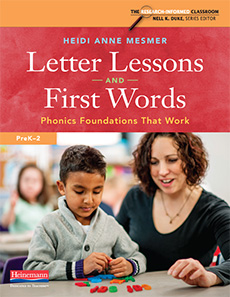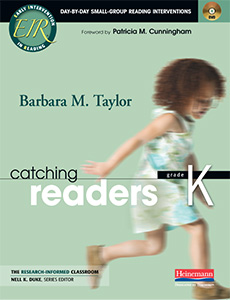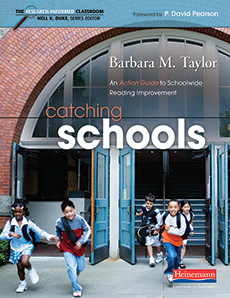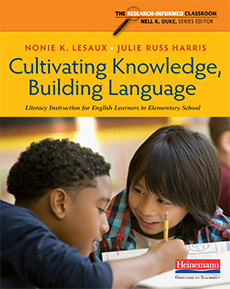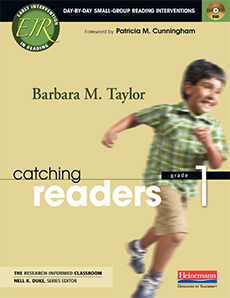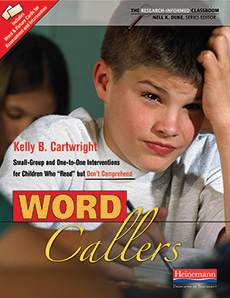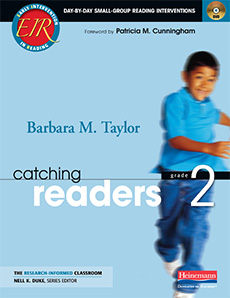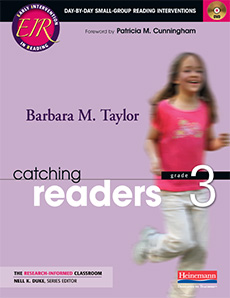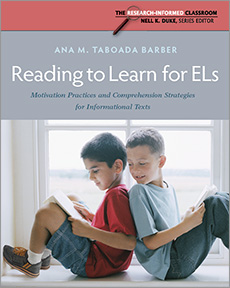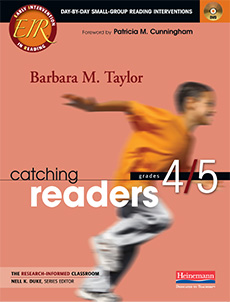The Research-Informed Classroom Series
Nell K. Duke, a researcher known for her efforts to bridge research and practice in literacy education, presents The Research-Informed Classroom. The series brings rigorous classroom-based research to bear on persistent challenges of classroom practice. Each resource explains research findings in an accessible, informative manner and demonstrates how to put these findings into action through classroom practices. The series gives teachers thoughtful take-aways for their next teaching day while providing coaches and administrators with roadmaps for research-based practice.
Heidi Anne Mesmer, Nell K Duke
If you’re not sure how phonics fits within your daily instruction, or crave a more effective process for teaching phonics, Heidi Anne Mesmer is here to help. In Letter Lessons and First Words, Heidi Anne provides a research-based vision of what lively, engaging phonics instruction can look like, along with practical, classroom-tested tools to make it happen in your classroom. Heidi Anne provides a one-stop... more
“When we're true to children's developmental needs and know which books to put in their hands, good things fall into place. The key is to focus on the children and the practices we know help them to read at each grade level,” says Barbara Taylor. These foundational beliefs have been the focus of Barbara Taylor's career and inspired her to create the Early Intervention in Reading (EIR) process. After more than two decades of classroom practice and... more
Based on her work over the last decade with more than 100 schools and visits to more than 5000 classrooms, Barbara Taylor shares her School Change in Reading (SCR) reform model in Catching Schools. At the heart of the reform model is the belief that student learning improves when teachers are supported with research-based, effective reading instruction and are given a way to work alongside one another to hone their teaching... more
Nonie K. Lesaux, Julie Russ Harris, Nell K Duke
“What is the very best instruction for English learners? How do we capitalize on and further develop the linguistic knowledge and skill of this segment of society? Nonie Lesaux and Julie Harris are exceedingly well qualified to address these questions. On the cutting edge of EL instruction, their combination of research knowledge and practical experience makes for guidance that can be trusted, and implemented, in classrooms throughout the... more
Ian A.G. Wilkinson, Kristin Bourdage, Nell K Duke
Teachers know quality talk helps develop students’ intelligence. Unfortunately, there hasn’t been enough support in showing teachers how to plan for this kind of talk. In this book, authors Ian Wilkinson and Kristin Bourdage bring together research-proven approaches to talk about text and offer teachers different models based on the specific skills they want to develop in students. More than just one approach, theirs is a versatile collection... more
“When we're true to children's developmental needs and know which books to put in their hands, good things fall into place. The key is to focus on the children and the practices we know help them to read at each grade level,” says Barbara Taylor. These foundational beliefs have been the focus of Barbara Taylor's career and inspired her to create the Early Intervention in Reading (EIR) process. After more than two decades of classroom practice and... more
Kelly B Cartwright, Nell K Duke
Fast, effective, research-based interventions for struggling readers Have you ever zoned out during reading—pronounced the words, without processing their meaning? This is how “word callers” experience all reading, In fact, strong decoders with limited comprehension account for nearly a third of all struggling readers. Now there’s powerful new hope for them in Word Callers. “Word... more
Replacement word-and-picture-cards plus the two-by-two matrix for Kelly Cartwright’s Word Callers. SAVE 10% with 5-packs of word-and-picture cards!... more
“When we're true to children's developmental needs and know which books to put in their hands, good things fall into place. The key is to focus on the children and the practices we know help them to read at each grade level,” says Barbara Taylor. These foundational beliefs have been the focus of Barbara Taylor's career and inspired her to create the Early Intervention in Reading (EIR) process. After more than two decades of classroom practice and... more
“When we're true to children's developmental needs and know which books to put in their hands, good things fall into place. The key is to focus on the children and the practices we know help them to read at each grade level,” says Barbara Taylor. These foundational beliefs have been the focus of Barbara Taylor's career and inspired her to create the Early Intervention in Reading (EIR) process. After more than two decades of classroom practice and... more
Ana M. Taboada Barber, Nell K Duke
Gaining knowledge from informational texts is an essential academic skill. Yet for too many English Learners, this skill is not developed sufficiently and as they move from elementary into middle school, the reading gap becomes a knowledge gap. This doesn’t have to happen, researcher Ana Taboada Barber explains, if we support EL’s reading of informational texts by pairing motivation practices with explicit reading comprehension instruction. Taboada... more
“When we're true to children's developmental needs and know which books to put in their hands, good things fall into place. The key is to focus on the children and the practices we know help them to read at each grade level,” says Barbara Taylor. These foundational beliefs have been the focus of Barbara Taylor's career and inspired her to create the Early Intervention in Reading (EIR) process. After more than two decades of classroom practice and... more



